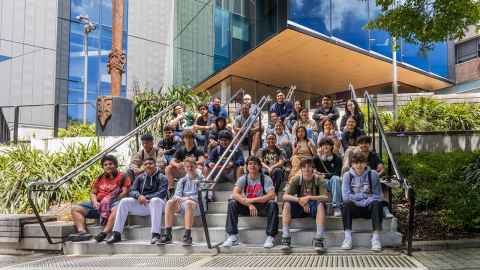Mission to boost Māori and Pacific engineering workforce
18 April 2023
The University of Auckland Faculty of Engineering’s Apollo programme has lift-off.

But unlike NASA’s Moon-landing programme of the same name, the University’s mission doesn’t involve leaving Earth’s atmosphere but is aimed at boosting the numbers of Māori and Pacific engineering graduates.
On board with this five-year mission budgeted to cost $2.1 million are several donors who collectively fund it to the tune of $1.1 million. They include The Dines Family Charitable Trust, Fisher & Paykel Healthcare Foundation, the Estate of John W Turnbull, and Engineering alumni through the Auckland University Engineers Association endowment fund. The remaining $1 million will come from a number of corporate donors and partners from the engineering sector, and the Faculty.
Apollo’s Kaiārahi, or navigator, is Steve Roberts who began developing it and the accompanying Genesis programme four years ago. Whereas Genesis, which helps secondary students who are struggling with the maths and physics needed to get into engineering, was severely disrupted by Covid, Steve says the fourth Apollo programme under way now is steering 50 students into the discipline and aims to have 100 by October 2023.
“Apollo starts with Year 12s who are going into Year 13,” says Steve, “and what we know is that 60 percent of Māori and Pacific students will not go from Year 12 maths into Year 13 calculus.” Calculus is a required subject for engineering.
Steve says a combination of factors cause the drop-off, including students’ lack of awareness of careers that rely on maths and those jobs’ earning potential, a shortage of calculus teachers and the streaming of ‘high-risk’ Māori and Pacific students away from maths because schools are wary of recording poor NCEA results.
“In Apollo, we bring them in after the Year 12 exams and give them exposure to the differentiation part of the NCEA level 3 maths course even before they head into Year 13.”
That does a number of things.
“It enables them to connect to the engineering school and understand where the maths fits, it puts them ahead of the curve before Year 13 and it allows us to go back to schools where students would have been streamed out and say, ‘This student passed the Apollo exam and you need to move him or her back into level 3 calculus.’”
With students having sacrificed two-thirds of their summer holidays to do the programme, Steve says the University is trying to persuade the New Zealand Qualifications Authority to include Apollo achievements in NCEA result transcripts.
The student commitment extends beyond four weeks over the summer to further Apollo learning sessions in the April, July and October school holidays.
At a time when New Zealand, and indeed the whole world, is facing a shortage of skilled engineers, we simply cannot afford to overlook the talent and perspective of such a significant and growing part of the population.
Steve, a former professional baseball player in the US who went on to become a talent scout, says engineering as a career doesn’t get the marketing benefits medicine and law enjoy from numerous TV drama series. Nonetheless, Apollo is working.
In 2022, when overall first-year engineering enrolments were almost five percent down, Māori and Pacific enrolments increased slightly from 100 to 101. Without 17 students from the 2021 Apollo programme choosing engineering, first-year Māori and Pasifika enrolments could have fallen 17 percent.
Steve expects about 60 percent of the present Apollo cohort to go on to be engineers. Female students make up about 30 percent of those in the programme. Many of those who don’t choose engineering will choose science instead and that, according to Steve, is also a great result.
Past participants are enthusiastic about and appreciative of the programmes, one saying Apollo set him on the right subject track for civil engineering and another saying he doesn’t know where he would have got in his “fight” to do computer-systems engineering without Apollo.
Peni Tata, a 2019 Genesis alumnus who in 2023 is in his final year of mechanical engineering, credits the programme with enabling him to meet the degree’s entry requirements.
“It was an amazing opportunity.”
Now, helping extend the same opportunity to other students by working on the Apollo programme, he sees Steve opening their eyes to engineering’s career possibilities, in particular by bringing their cultural heritage to the profession.
“He talks to them about situations such as developing a road or a bridge that might have ethical issues – for example, its effect on local iwi – and making sure those interests are represented.
“For the communities students come from and go back to, it’s a great investment.”
Dean of Engineering Professor Gerard Rowe says whereas more than a third of school-age children are Māori and Pacific, they represent just under ten percent of University of Auckland engineering students. The country’s engineering workforce is made up of only six percent Māori and two percent Pacific people.
“At a time when New Zealand, and indeed the whole world, is facing a shortage of skilled engineers, we simply cannot afford to overlook the talent and perspective of such a significant and growing part of the population.”
With donor support, the faculty and front-line staff have developed a strategy through to 2026 that will substantially increase the programmes’ reach and delivery to many more schools, including in regions outside Auckland. The goal is for more than 200 students to succeed through Apollo each year, up from only 50 in the past.
“The Genesis and Apollo programmes are key to addressing historic barriers and challenges and significantly increasing the number of Māori and Pacific students studying engineering at the University,” the dean says.
Media contact
Helen Borne | Communications Manager
Alumni Relations and Development
Email: h.borne@auckland.ac.nz